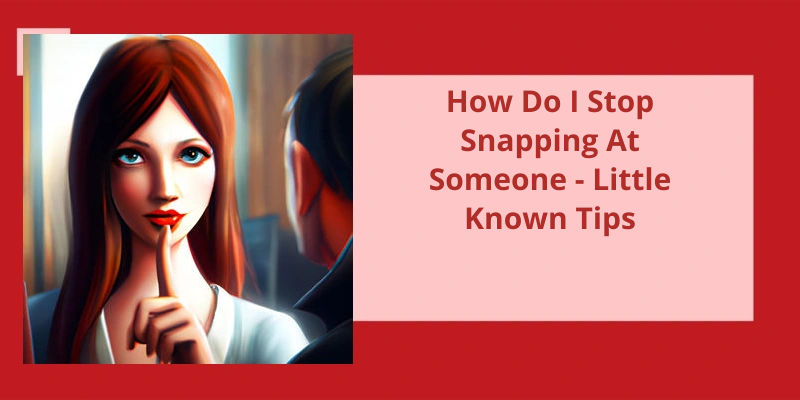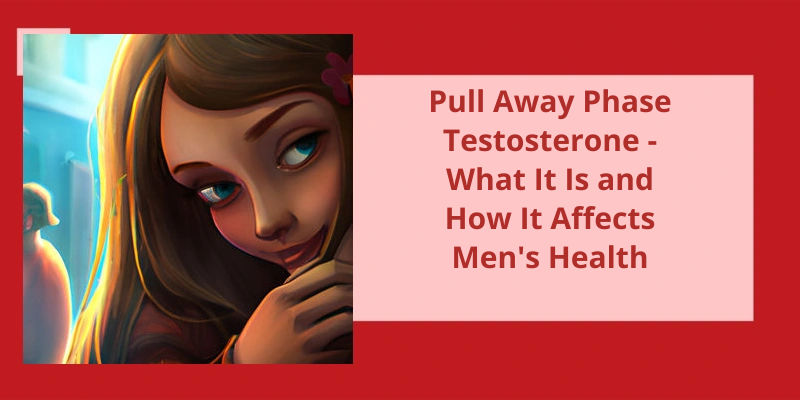In our fast-paced and demanding lives, it's all too common to find ourselves snapping at someone, whether it be a loved one, a colleague, or even a stranger. This impulsive and reactionary behavior can leave us feeling guilty, regretful, and disconnected from those around us. However, there are little known tips and strategies to help curb this tendency and foster healthier communication and relationships. By understanding the root causes of our snapping, practicing self-awareness and mindfulness, and implementing effective communication techniques, we can learn how to regain control over our reactions and create a more harmonious environment for ourselves and others. In this blog, we will explore these little known tips and delve into practical steps that can be taken to stop snapping at someone, ultimately leading to improved relationships, increased empathy, and a greater sense of overall well-being.
How Do You Stop Yourself From Snapping at Someone?
Instead of reacting with anger, communicate your emotions calmly and effectively. Sometimes, simply expressing your feelings can alleviate tension and prevent snapping. By discussing your concerns with the person involved, you create an opportunity for understanding and mutual resolution. Moreover, reaching out to a trusted friend or family member can provide valuable perspective and support. Sharing your frustrations and seeking advice can shed light on alternative ways to handle the situation.
Practice self-care and stress management techniques. It’s crucial to prioritize your mental and physical well-being. Engaging in regular exercise, practicing deep breathing exercises, and utilizing relaxation techniques such as meditation or mindfulness can help reduce stress and regulate emotions. Additionally, getting enough sleep, maintaining a healthy diet, and taking breaks when needed are vital aspects of self-care. By implementing these practices, you can reduce irritability and increase your ability to handle challenging interactions without snapping.
Seek professional help if necessary. If you find that snapping at others is a recurring issue and affecting your relationships and overall well-being, it might be beneficial to seek professional help. A therapist or counselor can help you delve deeper into the root causes of your reactions and provide you with effective strategies and techniques to manage anger and communicate assertively.
Practice active listening and empathy. When engaged in conversation, make a conscious effort to actively listen to the other persons perspective without interrupting or judgment. By truly understanding where they’re coming from, it becomes easier to respond thoughtfully and avoid snapping. Cultivating empathy for the other persons feelings and experiences can also promote patience and compassion in your interactions.
Take responsibility for your actions. Recognizing when you’ve snapped at someone and acknowledging the impact of your words or behavior is essential. Apologize sincerely and strive to make amends if necessary. Taking responsibility for your actions demonstrates maturity and a commitment to personal growth. By learning from your mistakes and making a conscious effort to change your behavior, you can develop healthier ways of communicating and foster stronger relationships.
There are various factors that can contribute to a person’s sudden and extreme outburst, commonly known as “snapping.” According to psychiatrists, these risk factors encompass a range of conditions such as brain tumors, seizures, substance abuse, and psychosis associated with disorders like schizophrenia. Understanding these underlying causes can shed light on this perplexing phenomenon, bringing us one step closer to comprehending human behavior at it’s most volatile.
What Causes a Person to Snap?
What causes a person to snap? There are clear risk factors to snapping, psychiatrists say. These include brain tumors, seizures, alcohol and drug abuse, and psychosis stemming from schizophrenia or other disorders. While some may think snapping is a result of anger management issues, it can often be attributed to underlying physiological or psychological problems.
Brain tumors can significantly impact a persons behavior and mental state, leading to sudden outbursts and aggression. Similarly, seizures can cause uncontrollable bursts of emotions, including anger. Alcohol and drug abuse can also have a profound effect on a persons ability to control their emotions, leading to sudden snaps.
Psychosis, often associated with disorders like schizophrenia, can create a distorted perception of reality, leading individuals to lash out without warning. These conditions can impair judgment and impulse control, making it difficult for someone to regulate their reactions appropriately.
Apart from these risk factors, there may be other underlying causes as well. Environmental stressors, such as chronic frustration, workplace pressure, or relationship conflicts, can gradually build up, eventually causing someone to “snap” under the accumulated tension. Moreover, unaddressed emotional trauma or unresolved conflicts can also contribute to explosive outbursts as a way of releasing pent-up emotions.
Conclusion
In conclusion, finding ways to control our impulses and prevent ourselves from snapping at someone requires self-awareness, empathy, and effective communication skills. By taking a moment to identify our triggers, practicing mindfulness, and utilizing techniques such as deep breathing or counting to ten, we can gain a better understanding of our emotions and choose a calmer response. Additionally, fostering open and honest communication with the person we’re interacting with can help in resolving conflicts and preventing future snapping incidents. Ultimately, through continuous self-reflection and a commitment to personal growth, we can create healthier and more harmonious relationships, leading to a more fulfilled and peaceful life.






